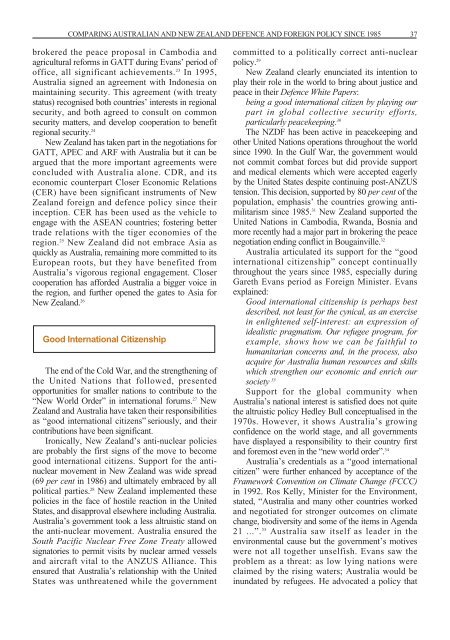ISSUE 136 : May/Jun - 1999 - Australian Defence Force Journal
ISSUE 136 : May/Jun - 1999 - Australian Defence Force Journal
ISSUE 136 : May/Jun - 1999 - Australian Defence Force Journal
- No tags were found...
You also want an ePaper? Increase the reach of your titles
YUMPU automatically turns print PDFs into web optimized ePapers that Google loves.
COMPARING AUSTRALIAN AND NEW ZEALAND DEFENCE AND FOREIGN POLICY SINCE 1985 37brokered the peace proposal in Cambodia andagricultural reforms in GATT during Evans’ period ofoffice, all significant achievements. 23 In 1995,Australia signed an agreement with Indonesia onmaintaining security. This agreement (with treatystatus) recognised both countries’ interests in regionalsecurity, and both agreed to consult on commonsecurity matters, and develop cooperation to benefitregional security. 24New Zealand has taken part in the negotiations forGATT, APEC and ARF with Australia but it can beargued that the more important agreements wereconcluded with Australia alone. CDR, and itseconomic counterpart Closer Economic Relations(CER) have been significant instruments of NewZealand foreign and defence policy since theirinception. CER has been used as the vehicle toengage with the ASEAN countries; fostering bettertrade relations with the tiger economies of theregion. 25 New Zealand did not embrace Asia asquickly as Australia, remaining more committed to itsEuropean roots, but they have benefited fromAustralia’s vigorous regional engagement. Closercooperation has afforded Australia a bigger voice inthe region, and further opened the gates to Asia forNew Zealand. 26Good International CitizenshipThe end of the Cold War, and the strengthening ofthe United Nations that followed, presentedopportunities for smaller nations to contribute to the“New World Order” in international forums. 27 NewZealand and Australia have taken their responsibilitiesas “good international citizens” seriously, and theircontributions have been significant.Ironically, New Zealand’s anti-nuclear policiesare probably the first signs of the move to becomegood international citizens. Support for the antinuclearmovement in New Zealand was wide spread(69 per cent in 1986) and ultimately embraced by allpolitical parties. 28 New Zealand implemented thesepolicies in the face of hostile reaction in the UnitedStates, and disapproval elsewhere including Australia.Australia’s government took a less altruistic stand onthe anti-nuclear movement. Australia ensured theSouth Pacific Nuclear Free Zone Treaty allowedsignatories to permit visits by nuclear armed vesselsand aircraft vital to the ANZUS Alliance. Thisensured that Australia’s relationship with the UnitedStates was unthreatened while the governmentcommitted to a politically correct anti-nuclearpolicy. 29New Zealand clearly enunciated its intention toplay their role in the world to bring about justice andpeace in their <strong>Defence</strong> White Papers:being a good international citizen by playing ourpart in global collective security efforts,particularly peacekeeping. 30The NZDF has been active in peacekeeping andother United Nations operations throughout the worldsince 1990. In the Gulf War, the government wouldnot commit combat forces but did provide supportand medical elements which were accepted eagerlyby the United States despite continuing post-ANZUStension. This decision, supported by 80 per cent of thepopulation, emphasis’ the countries growing antimilitarismsince 1985. 31 New Zealand supported theUnited Nations in Cambodia, Rwanda, Bosnia andmore recently had a major part in brokering the peacenegotiation ending conflict in Bougainville. 32Australia articulated its support for the “goodinternational citizenship” concept continuallythroughout the years since 1985, especially duringGareth Evans period as Foreign Minister. Evansexplained:Good international citizenship is perhaps bestdescribed, not least for the cynical, as an exercisein enlightened self-interest: an expression ofidealistic pragmatism. Our refugee program, forexample, shows how we can be faithful tohumanitarian concerns and, in the process, alsoacquire for Australia human resources and skillswhich strengthen our economic and enrich oursociety 33Support for the global community whenAustralia’s national interest is satisfied does not quitethe altruistic policy Hedley Bull conceptualised in the1970s. However, it shows Australia’s growingconfidence on the world stage, and all governmentshave displayed a responsibility to their country firstand foremost even in the “new world order”. 34Australia’s credentials as a “good internationalcitizen” were further enhanced by acceptance of theFramework Convention on Climate Change (FCCC)in 1992. Ros Kelly, Minister for the Environment,stated, “Australia and many other countries workedand negotiated for stronger outcomes on climatechange, biodiversity and some of the items in Agenda21 ...”. 35 Australia saw itself as leader in theenvironmental cause but the government’s motiveswere not all together unselfish. Evans saw theproblem as a threat: as low lying nations wereclaimed by the rising waters; Australia would beinundated by refugees. He advocated a policy that

















